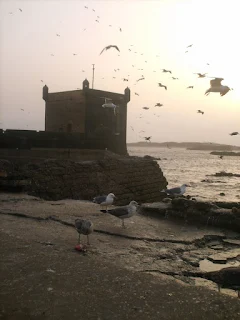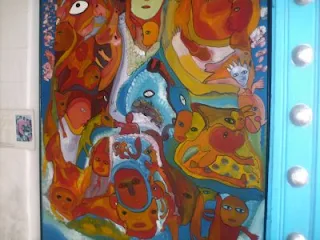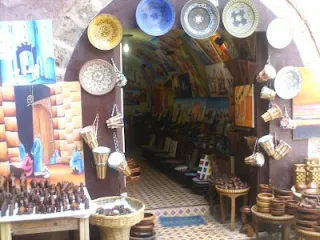
Fatih Akin makes a wonderful movie about two people getting in love after they hate each other . No doubt Akin 's characters evaluate as the story goes on .The story does not deal with generation conflict especially those muslims who live in Europe mainly Turks .
It is a strong drama written carefully by Fatih who puts bold sex scenes and a creative soundtrack . I just like the evolution of the characters from being more unstable to reasonable ones.Well done Akin .
Allal El Alaoui
links:
http://www.indiewire.com From the "People" Archives:
From the "People" Archives:
Going to Extremes: Fatih Akin on His Turkish-German Love Story "Head-On"
by Wendy Mitchell
Fatih Akin (right) with "Head-On" stars Birol Unel (left) and Sibel Kekilli (center) at the 2004 Berlin, where the film won the Golden Bear. Photo by Eugene Hernandez.
Fatih Akin's "Head-On" is an energetic blast of extreme situations -- it has laughs and tears, goth songs by The Sisters of Mercy alongside Turkish traditionals, the hip bars of Hamburg and the dusty cafes of Istanbul, and -- of course -- love and hate.
The story follows Cahit (Birol Unel), a miserable, drunken aging punk rocker, and Sibel (former adult film actress Sibel Kekilli), a woman so oppressed by her traditional Turkish parents that she's suicidal. Sibel and Cahit enter into a marriage of convenience, which of course becomes inconvenient when they start to fall for each other. Turkish-German filmmaker Akin says this film is his most personal work to date -- in fact, he got the idea when a Turkish-German wanted to marry him about 10 years ago (he said no, but realized back then it would make a fantastic idea for a film).
That basic plot does no justice to the many complex layers at work in "Head-On," about culture clashes, generational misunderstandings, and the unexpected consequences of love. The film's strengths go beyond impeccable acting and sharp writing -- it also boasts some bold sex scenes and a creative soundtrack.
"Head-On" premiered at the 2004 Berlinale and won that festival's prestigious Golden Bear, followed by other festival prizes and five German Lolas. Even more impressively, it beat out such films as "Bad Education" and "Vera Drake" to win the Best European Film of 2004. indieWIRE contributor Wendy Mitchell spoke to Akin about drama and dark humor, on-camera chemistry, Turkish stereotypes, and his new documentary about music in Istanbul. Strand Releasing releases it on January 21 at the Angelika in New York, dates in other cities will follow.
indieWIRE: This is a serious film, but with a lot of dark humor... Did you spend time trying to lighten it with comedic parts or did you just let it evolve naturally?
Fatih Akin: The situation is just funny. Like when Cahit and the uncle came to her parents to ask for Sibel's hand in marriage, that whole situation is just very absurd. But at the same time it's very real. It's just situational humor. I think stuff like that happens automatically. And when you direct, it you see the humor of it. Because it's such a dark story, you go for the humor. Germans try to categorize films: in a comedy, you just laugh and in a drama, you're not allowed to laugh. I don't believe in that, sometimes we laugh and cry in the same hour. It's dangerous when you have a drama and you put humor in it. I think it's the opposite, the funnier it is in the beginning of such a story, the more dramatic it can become. Because when an audience is laughing, that's opening their souls somehow, and when you have an audience with an open soul, it's much better to hit them with a knife.
iW: So did you actually write this script 10 years ago, or what was the process like?
Akin: The process was growing throughout the years. During that I was working on many different other films -- this is my fourth film in about 8 to 10 years. It was growing with each experience, with each shooting, you get more and more experienced and you use that for your story. Actually, I really started to sit down and write it after 9/11, I started to write it in 2002 and it took me one year of writing it. It has a lot of stuff to do with growing. Even the film is about growing. Not coming of age, but the quest for living, where are we going.
iW: Part of the reason the film works so well, obviously, is the chemistry between Birol and Sibel. What was the casting process -- you knew Birol before, so did you always picture him in this role?
Akin: Yes, he was like a basis for this film. I had the story in my mind in 1995, 10 years ago. Also that was the first time I saw Birol on the screen, at a film festival, in a film made by a director from Luxembourg. I fell in love with him on screen, I thought he was a fantastic actor. And in the credits I saw that he was Turkish like me. So I wanted to meet this guy. I met him and we became friends, and he had a small part in my film "In July." We always spoke about this project. He's like the character in the film -- he's such a punk guy in this surrounding of the Turkish world. It was easy for me to write this stuff. I knew the way Birol speaks, I knew the way he moves, the way he dresses. It was so easy to write and create that for Birol. It was much more difficult for Sibel -- not to write it, I knew exactly where to go with the character. But it was very difficult to find the right actress. I was glad to have Birol as part of the casting process, we could see him with each of the girls we were auditioning to see who worked as a couple.
iW: When you first saw Birol and Sibel together, how did you know that was the your right couple?
Akin: Well, it wasn't that they came together and we all said "bingo." Actually, they don't like each other. During the shoot, they respected each other but I cannot say that they really liked each other. But the casting was very simple, it was something on the surface. The camera loved them both as a couple. Visually, they are very sexy together. I used the fact that they don't like each other because the story is shot like that -- in the beginning, Cahit hates Sibel. So I could use that. We shot chronologically so their relationship developing in the film is what also happened on set -- not that they fell in love, but their respect for each other grew every day.
iW: Did Birol and Sibel bring a lot to the characters? Was there a lot of improvisation?
Akin: They bring a lot. I think there are two types of directors... the first kind doesn't allow anything for improvisation and you follow each comma in the script. I'm not like that, once I start shooting I forget the scriptwriter in me. I like things flowing. If you have talented actors who bring their own ideas, it can be much better than what you have worked out. Before we shot, we had three weeks of rehearsals, and during that process we changed a lot. They brought a lot of ideas to it. Although we had those strict rehearsals and changed the script then, we didn't go crazy on the set. I don't want to come to the set and not know what we're doing. But even occasionally on the set we'd react to things. It was like destiny was directing the film, I just went with the flow.
iW: Music seems so central to this film... I heard you are a DJ, so did you handpick all of this music yourself?
Akin: Yes, I picked most of the music before the film started. It was a good experience. It's like how I collected the script with experiences. Certain things I saw, certain stories people told me, I wrote them down. That all connected with each other. Same thing with the music, I listen to a lot of music... For example, the track playing when Sibel is cooking, I was listening to that for the first time, and I thought, this could be great for a cooking scene, and I wrote that down in my notes. I always listen to music when I write, I need a rhythm to write. When I was writing the bar fight scene, I was by chance listening to that track, "After Laughter Comes Tears" by Wendy Rene. I thought, "This fits perfectly well." So I just noted that while I was writing. When I had all my songs, we realized we wanted to have an extensive budget for the music. I wanted 100,000 euros, not the usual 20,000 euros. On the other hand, I didn't spend much money on costumes (those were the actors' personal clothes), I didn't use much money for lighting, and all the film is shot by hand cameras, so we could put that money to the music. As a director, you can transform your vision more with the music. Film is a two dimensional thing -- it goes up and down and left to right but if you put that music into that two dimensional medium, it became like a third, fourth, and fifth dimension, I really believe in that.
iW: What about the Turkish singer and chorus on the Bosphorus, what inspired that?
Akin: That's like a Brechtian element. As a young scriptwriter I like to try things out, so with this story it was not fitting into a three-act dramaturgy. It's too complicated or too different. I read a lot about theater and I discovered Brecht, and also classical Greek tragedy, and they are built on five structural acts. I wanted to work with that, and to really show the audience when a new act is beginning, One of the basic ideas for the mood of the film was the idea that western punk music is really connected -- in the lyrics for example -- into classical Turkish music. Both are about how you can love somebody so much you go insane, you feel so much passion that you want to hurt yourself. Even with Depeche Mode or Nick Cave or Iggy Pop, I discovered a connection to the eastern world, so I wanted to bring that to the film. Also it was a way to break the Western, realistic look of the film with a kitschy postcard element. But those elements are connected to each other, and that's me.
iW: This film shows this Turkish immigrant experience, but it's so not a stereotyped film, these are such unique individuals. I wondered how Turkish people have reacted to the film?
Akin: When I wrote the film, I kept in my mind that I have three audiences -- obviously there are more, but these are three big ones -- German, Turkish, German-Turkish (people like me). They are all different from each other. The Turkish people were really positive. The biggest compliment I got is that the Turkish film world saw it as part of Turkish cinema.
The German-Turkish audience was very divided. Half of the reactions were very positive. Some people say, "We can identify with that. It's my story." But we had a lot of people who were really angry about it, saying, "Why do you just show the bad attitudes of our society? Or how can you show Turkish women naked in the film?" It was every extreme.
iW: Do you think this is a realistic depiction of the Turkish immigrant experience abroad?
Akin: Like you mentioned, those characters aren't typical. They aren't representative of the general Turkish minority in Germany. But the conflict is representative. This film came after 9/11. The world really changed after that. The Muslim world is considered in a much different way after 9/11. For me actually it is about generation conflict -- my parents have another attitude, another education, another background than I have. And that's the same whether you are Muslim or Catholic, this generational difference. Look at Scorsese's early films, his characters are trying to get out of this Catholic background. Somehow it's a generation thing.
iW: The scene of Sibel getting attacked in the street is so painful to watch, was that difficult to film?
Akin: To be honest it's really not that difficult to film. You have to choreograph it carefully. But I don't like violence in movies, I'm not a kind of Tarantino fan. But sometimes it's necessary. Maybe it's too violent, but I needed this kind of shock for the audience. I wanted everyone to understand that when she was in that scene, it was her way of committing suicide. But to shoot that you need humor... otherwise you'd go crazy. One interesting thing is just after we shot that, the next day Sibel had appendicitis -- her body was getting ill exactly where she was hit with the fake knife. She believed what she was acting so much. It was almost like there was witchcraft on this movie shoot about things coming true after we had shot them. Another thing that happened was the scene about Sibel's parents getting the news about Cahit, people said that's trivial. But then Sibel's real parents found out her adult films from reading the newspapers. And her sister told Sibel that the same thing also happened as in the film, that her father was burning the pictures of Sibel. And the moment where Birol was quitting drinking in the film... when we shot it, he's actually an alcoholic, and he got so ill that he couldn't eat or drink anymore -- he was in therapy. When he came out of that, he weighed 15 kilos less. When he stropped drinking in the film, he really stopped drinking in reality.
iW: So now you have your own production company, and I hear you are working on a documentary now?
Akin: Yes, it's called "Crossing the Bridge," it's about the music scene in Istanbul. When we were shooting the musicians there for "Head-On," it was such an interesting world for me, that I wanted to share it with an audience. So we decided to make this documentary, and it covers all kinds of music -- Kurdish music, hip-hop music, gypsy music, Islamic music. And at the same time it's a portrait of the city and of the country.
iW: Do you enjoy the documentary work instead of a narrative?
Akin: Well, I did a documentary for television several years ago about my family. It won an award but I wasn't satisfied with it. I wanted to do it better. Fiction is my home, I came from fiction, I like to tell stories. But when you see "Head-On," it has this documentary style, so working on documentary can really help me working on fiction. I like the documentary work. Maybe every two films you need to do documentary to tell what you really want to tell and not be limited by the medium. With documentary you don't create the reality you have to hunt the reality.
iW: Do you have any other fiction scripts in the works?
Akin: I have two scripts, one I hope to shoot this year is called "Soul Kitchen," it's about a restaurant in the area of Hamburg where I live. It's a love story, about Greek owner of the restaurant who has a relationship with a basketball player with Serbia. It's a small project to try things out. It's a comedy. I'm a Billy Wilder fan, and comedy is much, much more difficult than drama. You know, it wasn't that difficult to shoot "Head-On." I just went out and did it -- my instinct could lead me. But with a comedy it's more about timing. I would like to try this.
After than, I have another project about the filmmaker Yimaz Guney, in 1982 he made a film called "Yol" (The Road), which shared the Palme d'Or in Cannes. He was a Kurdish filmmaker who was imprisoned in Turkey for 18 years and he made six films out of prison and then ran away from prison and made his last film in France and died in France. He's kind of notorious hero in Turkey. So his widow wants me to make a film about his life, so I'm working on that but it's a very big project. So there's a lot of stuff to do (laughs).
links:
http://www.indiewire.com/people/people_050119akin.htmlhttp://www.blogger.com/img/gl.link.gif

































